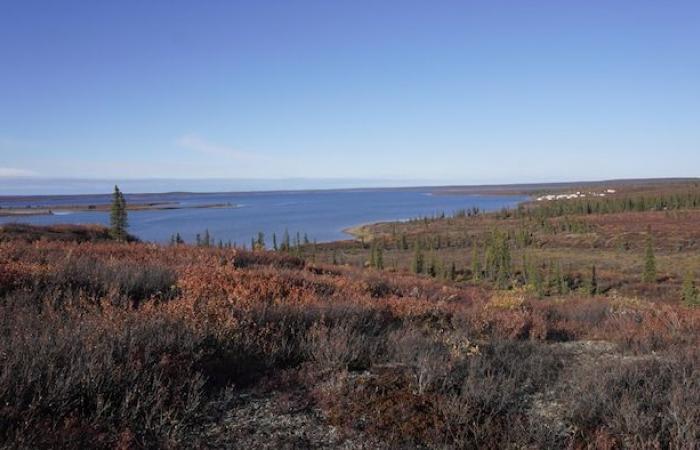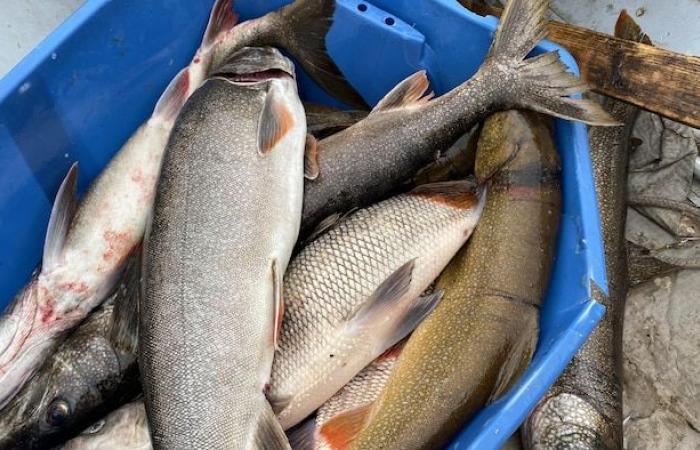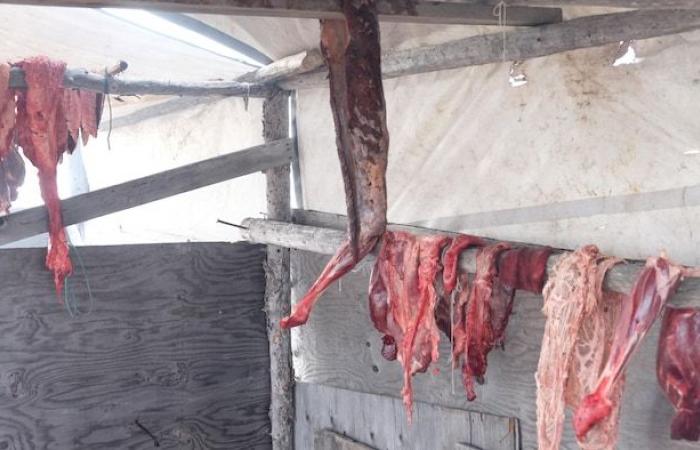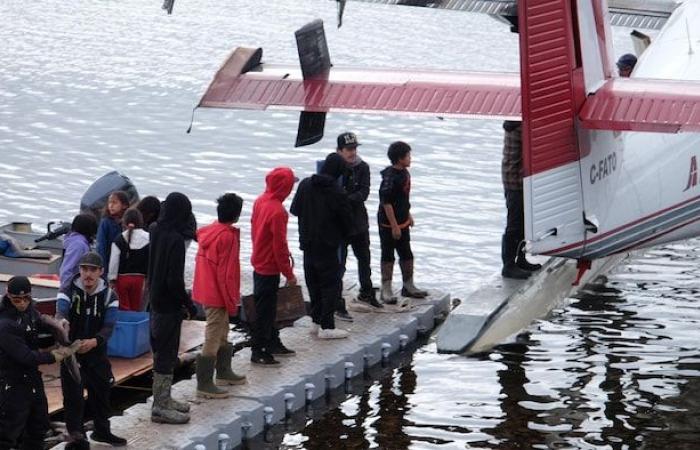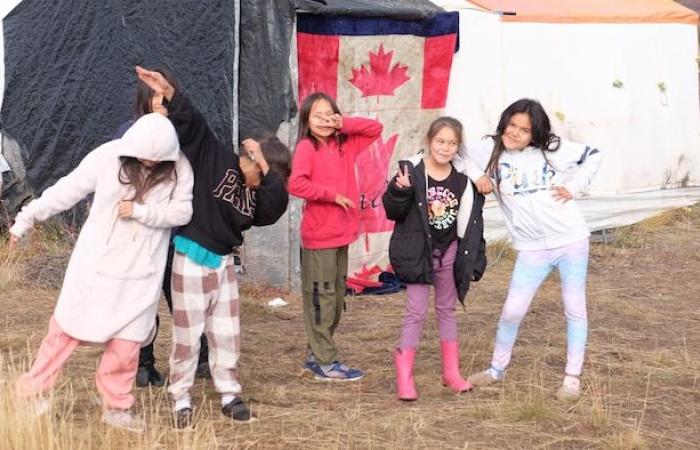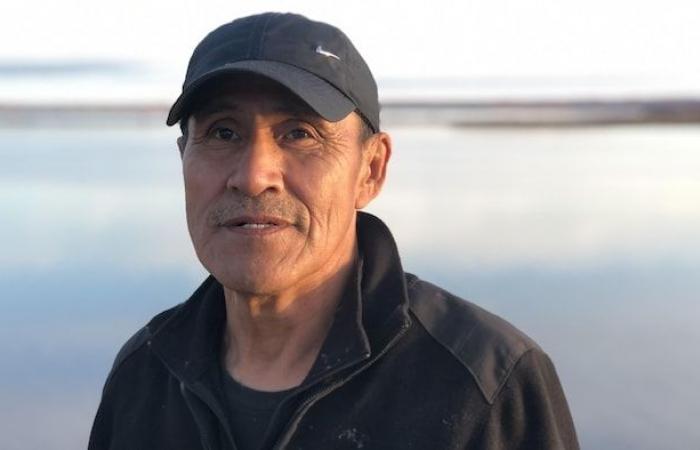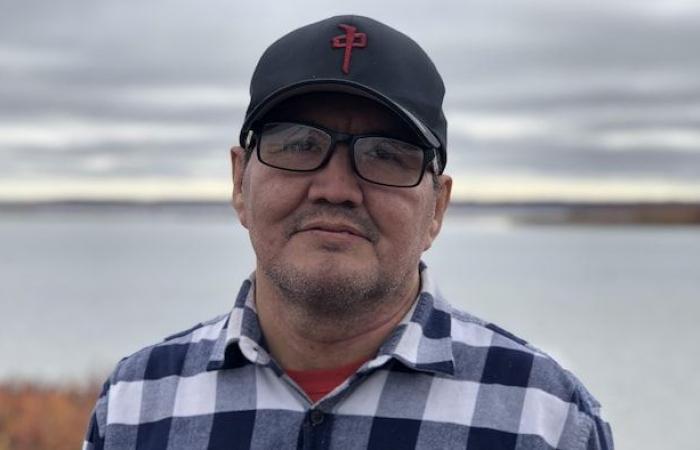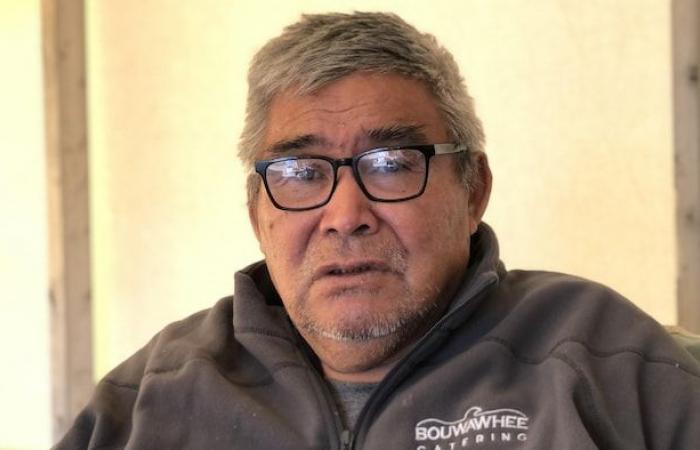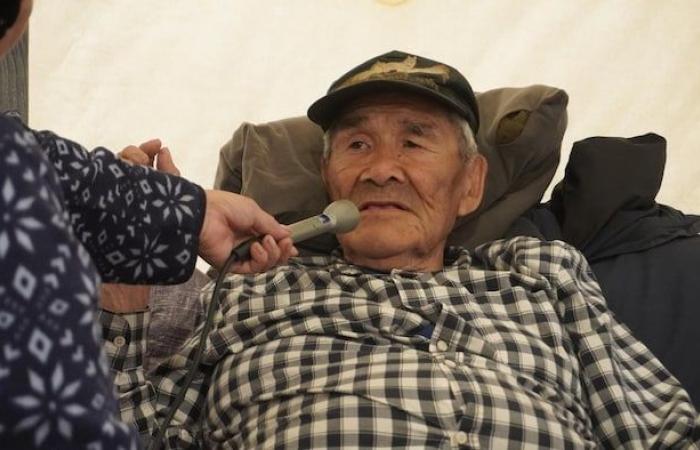The traditional territory of the people of Colville Lake, Northwest Territories, served as the backdrop, for the first time, to self-government negotiations between the community and the territorial and federal governments.
On September 10, chartered flights transported residents to the community’s traditional camp, located near Lake Horton, about 150 km from Colville Lake.
This isolated site, at the tree line, recalls the history and way of life of the ancestors. This is where the community meets today to continue this ancestral way of life that is dear to them.
Open in full screen mode
The camp visited by Colville Lake residents every year is a haven of peace in the middle of nature.
Photo : Radio-Canada / Luke Carroll
For Colville Lake, who for almost 10 years asked the territorial government and Ottawa to hold discussions on self-government at Lake Horton, this was the best way to make them understand how important this territory is. .
The government of T.N.-O. complied with this request by delegating two negotiators for the discussions which lasted two days, while federal negotiators joined virtually due to budget constraints.
Unity, joy and freedom
The camp, made up of tents heated by wood, is lined up on the edge of the lake. Small fruits grow in the surrounding area, grizzly bears are regularly seen nearby, and herds of caribou and musk oxen stop there during their migration.
Horton Lake is full of whitefish and trout, which can be caught with nets or fishing rods.
Coming here, we feel unity, joy and freedom
says Laura Tobac, resident of Colville Lake.
We eat our favorite food, caribou and fish, and we can see the children happy.
-
Open in full screen mode
Fish caught in the lake is one of the usual meals for community members on the ground.
Photo : Radio-Canada / Luke Carroll
-
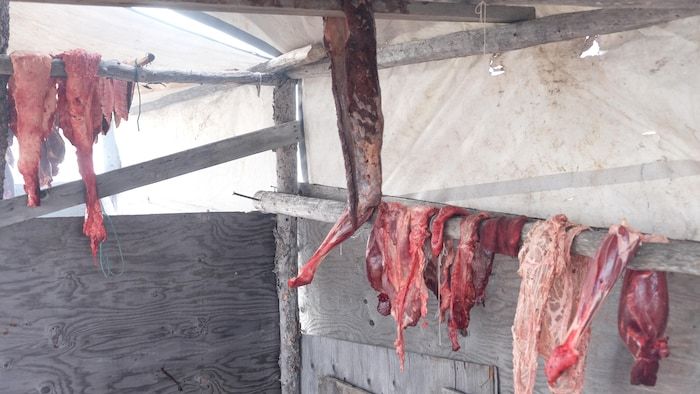
Open in full screen mode
Fresh game is dried at Horton Lake camp. The region is teeming with caribou and muskoxen.
Photo : Radio-Canada / Luke Carroll
-

Open in full screen mode
Members of the Colville Lake community form a chain to help unload a charter plane that arrived in Horton Lake.
Photo : Radio-Canada / Luke Carroll
-
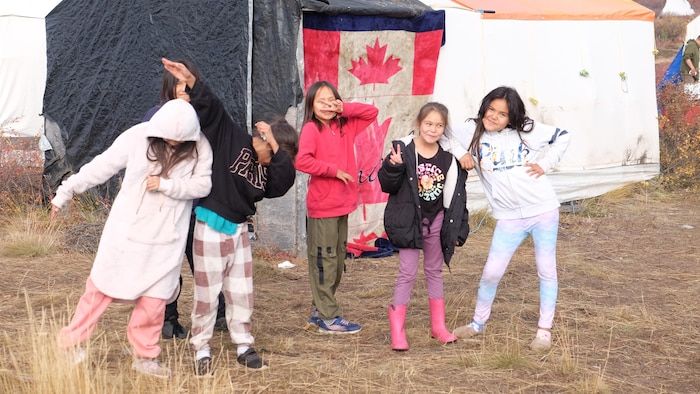
Open in full screen mode
Camp is a safe space for children who can come and go as they please.
Photo : Radio-Canada / Luke Carroll
Members of the Colville Lake community form a chain to help unload a charter plane that arrived in Horton Lake.
Photo : Radio-Canada / Luke Carroll
Fish caught in the lake is one of the usual meals for community members on the ground.
Photo : Radio-Canada / Luke Carroll
Album photo: Camp lac horton
The community has been meeting at Lake Horton annually for nearly 30 years. It is also a traditional site that ancestors used to visit.
According to the chief negotiator for the Behdzi Ahda First Nation, Joseph Kochon, several members of the community appreciated this idea of transposing the negotiations from a meeting room to the traditional camp.
We asked the [gouvernement du] Canada and [à celui des T.N.-O.] to meet us where they could see our people at work
he explains.
We travel here so much. Across the country, we’re walking on the pavement to go to the hotel, to the conference room, and there’s no real physical work, so it’s an opportunity to reconnect for a lot of us
.
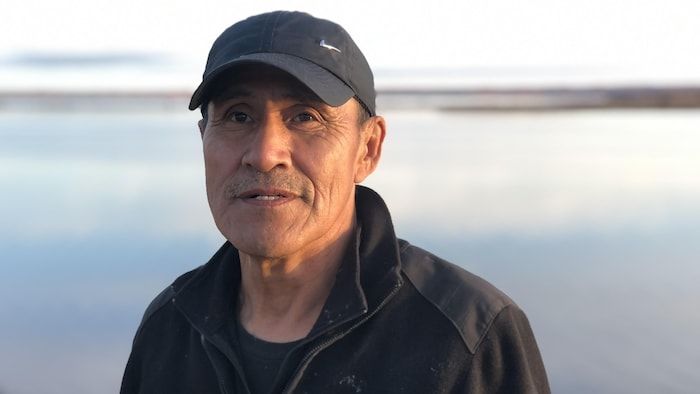
Open in full screen mode
According to Joseph Kochon, the community is probably a year or two away from establishing self-government.
Photo : Radio-Canada / Luke Carroll
At the camp, everyone has tasks to do, whether it is gathering and cutting wood, fishing or hunting, and carrying water. Wilbert Kochon, the great chief of the Sahtu, does not see these tasks as a chore. We show the youngest how we lived and how our ancestors lived
he said.
David Codzi, member of the negotiating team, agrees.
We come here just to continue [les traditions] with our families and our children, and we learn from the older ones as we go along
he says.
We were here long before the government and this is how we have always lived.
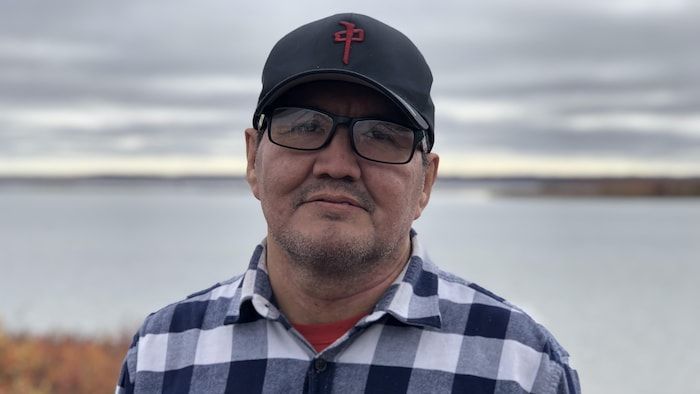
Open in full screen mode
David Codzi works in Colville Lake Community Government. He says it’s important for Northwest Territories negotiators to see what life is like in the territory.
Photo : Radio-Canada / Luke Carroll
Maintain the lifestyle
This meeting was scheduled to take place in 2023, but evacuations due to wildfires in the Northwest Territories pushed the event back to 2024.
The community worked extensively ahead of the meeting to build the discussion venue, a wooden structure.
These discussions are reserved for negotiating teams and take place in private. Colville Lake Chief Richard Kochon says these self-government agreements help preserve the language as well as fishing and hunting rights.
We would like to maintain our way of life
he declares. We want to be independent, not so dependent on the government […]. It will take a lot of weight off them.
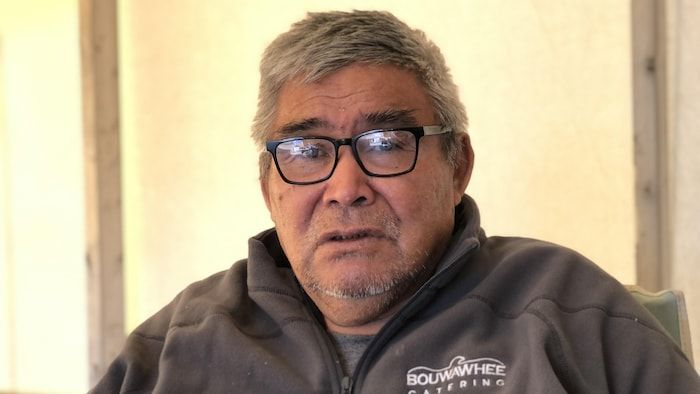
Open in full screen mode
Richard Kochon, Chief of Colville Lake, says once self-government is established, the community will assume many of the NWT’s responsibilities.
Photo : Radio-Canada / Luke Carroll
According to the Department of Crown-Indigenous Relations and Northern Affairs Canada, the negotiated agreements provide decision-making power to Indigenous governments who make their own choices about how to deliver programs and services to their communities
.
The right to self-government for Indigenous peoples is an inherent right under the Canadian Constitution. These agreements allow Indigenous governments to adopt their own laws and policies, and each negotiated agreement is unique.
An agreement within a year or two
Brendan Gully, a resident of Colville Lake, believes that this meeting on ancestral territory is a very important step forward
. The fact that the community actually establishes its autonomy would be a big step forward for it.
According to Joseph Kochon, it will take another one to two years to complete the process. For community members, like Elder Hyecinthe Kochon, it’s not a concern if it takes a little longer.
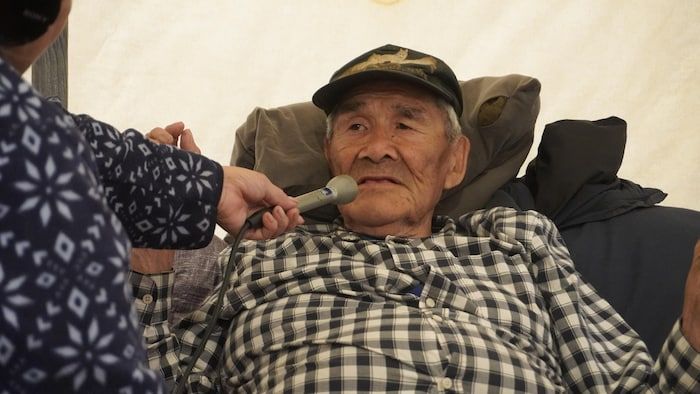
Open in full screen mode
Hyecinthe Kochon is an elder in the community.
Photo : Radio-Canada / Luke Carroll
It was really good [que les négociateurs territoriaux] have moved. My father is the only elder present and he is happy to see this
says Hyecinthe’s son, Wilbert Kochon.
By email, the spokesperson for the Ministry of Executive and Indigenous Affairs, Toyeke Adedipe, indicated that the GTNO was delighted to be invited by the community to Lake Horton to participate in a negotiation session on the territory
and that he would welcome the possibility of meeting again on the land in the future
.
With information from Luke Carroll

